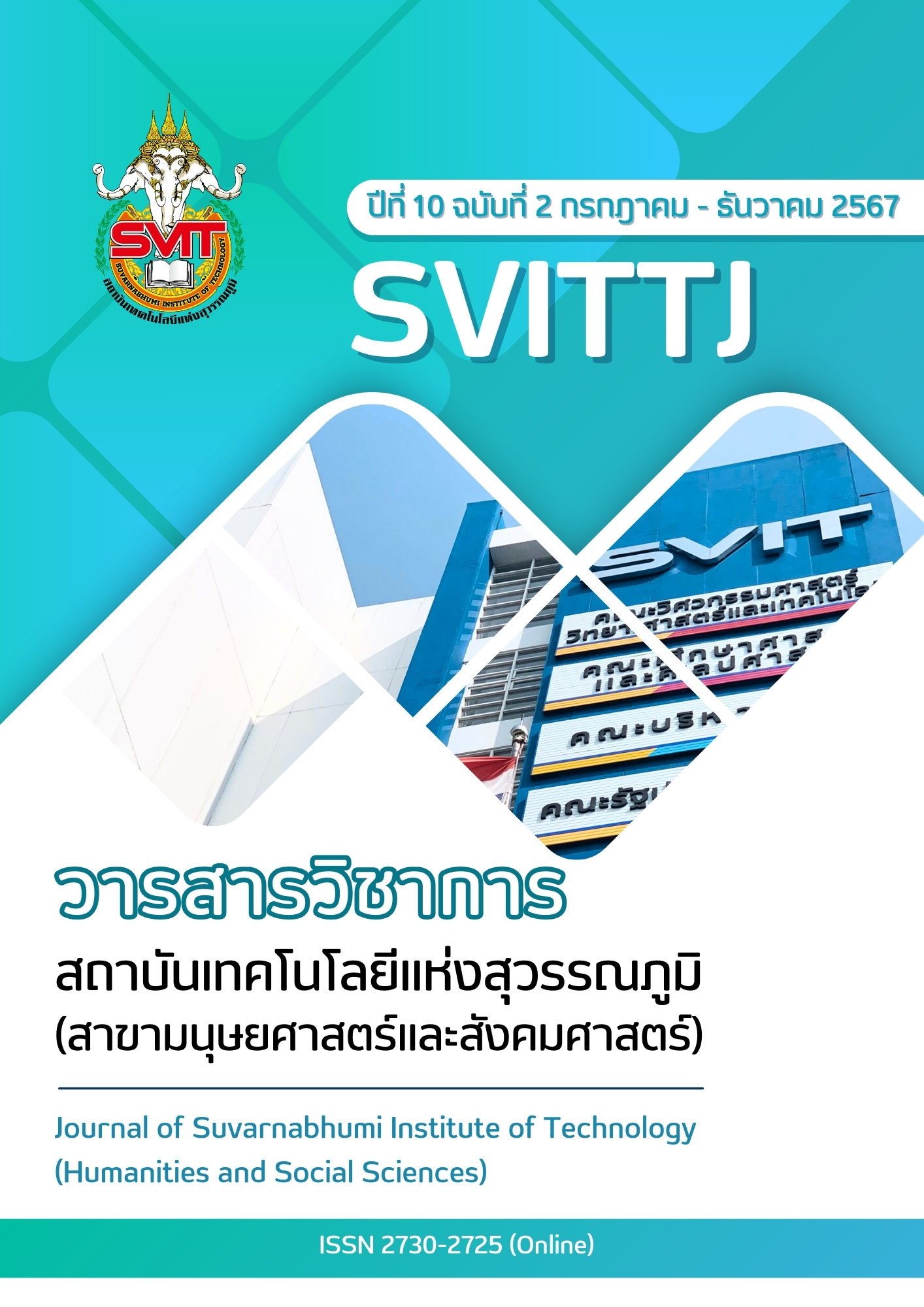SERVICE QUALITY IMPROVING THROUGH THE CUSTOMER JOURNEY IN THE AIRLINE BUSINESS: SERVICE PERSPECTIVES FOR VALUE CREATION IN THE ELDERLY PASSENGER NEEDS
Keywords:
Service Quality, Customer Journey, Airline Business, ElderlyAbstract
This academic article focuses on the Service Quality Improving the Customer Journey in the Aviation Industry: Addressing Aging Passenger Needs. By studying a review of literature from research document , books and related articles. It analyses information on the study points in the area of service needs, obstacles, through the service touch point of all process. To bring an analysis of improvement and development approaches to airline operators. It can be introduced as a guideline or policy to develop a better quality of service for older passenger groups. It is important to be able to respond to the service at the exact point of need, to minimize the chances of failures or errors in the service.
References
กระทรวงการพัฒนาสังคมและความมั่นคงของมนุษย์. (2553). พระราชบัญญัติผู้สูงอายุ พ.ศ.2546. สืบค้นจาก
กุศล สุนทรธาดา และกมลชนก ชำสุวรรณ. (2553). ระดับและแนวโน้มความมีพฤฒิพลังของผู้สูงอายุไทย. เอกสารการประชุมวิชาการประชากรศาสตร์แห่งชาติ วันที่ 25-26 พฤศจิกายน 2553. (น. 26-38). กรุงเทพฯ: ม.ป.พ.
จิราวดี รัตนไพฑูรย์ชัย. (2557). ตลาดนักท่องเท่ียวผู้สูงอายุ: โอกาสใหม่ไทย เติบโตรับ AEC. กรุงเทพธุรกิจ Section: ASEAN, 1.3(153), 1-2.
ชฎาพร จักรทอง และกนกกานต์ แก้วนุช. (2566). ปัจจัยที่ส่งผลต่อการตัดสินใจเลือกกิจกรรมการท่องเที่ยวเชิงเกษตรของกลุ่มผู้สูงวัยที่มีพฤฒพลังในประเทศไทย. วารสารวิชาการการท่องเที่ยวไทยนานาชาติ, 18(1), 62-85.
นน อัครประเสริฐกุล. (2566). การใช้ซอฟท์พาวเวอร์ (อิทธิพลอ่อน) อย่างมีประสิทธิภาพ: การใช้สื่อในการช่วยเมืองให้ใช้เทคโนโลยีที่ทันสมัยเพื่อการเปลี่ยนแปลงทางสังคม. วารสารกองทุนพัฒนาสื่อปลอดภัยและสร้างสรรค์. 2(2),1-30.
บุญเลิศ จิตตั้งวัฒนา. (2548). ธุรกิจการบิน. อุตสาหกรรมการท่องเที่ยว. กรุงเทพฯ: เพรส แอนด์ ดีไซน์.
บุญเลิศ จิตตั้งวัฒนา. (2551). ธุรกิจการบิน. กรุงเทพฯ: ศูนย์หนังสือมหาวิทยาลัยธรรมศาสตร์. ท่องเที่ยวไทย.
สิทธิชัย ศรีเจริญประมง. (2559). การบริการที่ดีเลิศ : หนึ่งในปัจจัยสู่ความสำเร็จของธุรกิจการบิน. วารสารมนุษยศาสตรและสังคมศาสตร มหาวิทยาลัยราชภัฏอุบลราชธานี. 7(1). 77-91.
สุภา จิรวัฒนานนท์ (2566). การสื่อสารการตลาดส่งผลต่อการรับรู้คุณภาพการบริการของสายการบินต้นทุนต่ำ. วารสารวิิชาการ มหาวิิทยาลััยราชภััฏกาญจนบุุรีี. 12(1), 112-125.
สำนักงานการบินพลเรือนแห่งประเทศไทย. (2565). สรุปข้อมูลข่าวสารอุตสาหกรรมการบินของไทย. สืบค้นจาก https://www.catc.or.th/wp
สำนักงานคณะกรรมการนโยบายเขตพัฒนาพิเศษภาคตะวันออก (สกพอ.). (2566). ข้อมูลประชาสัมพันธ์, สืบค้นจาก https://www.eeco.or.th
สำนักงานสภาพัฒนาการเศรษฐกิจและสังคมแห่งชาติ. (2562). รายงานการคาดประมาณประชากรของประเทศไทย พ.ศ. 2553 – 2583 (ฉบับปรับปรุง). สืบค้นจาก http://social.nesdc.go.th/
อานนท์ จันจิตร. (2563). การพัฒนาคุณภาพการบริการเพื่อการตั้งใจกลับมาใช้บริการช้ำของสายการบินต้นทุนต่ำในประเทศไทย. (วิทยานิพนธ์ปริญญามหาบัณฑิต, สถาบันบัณฑิตพัฒนบริหารศาสตร์).
Ang, L., & Buttle, F. (2006). Customer Retention Management Processes: A Quantitative Study European Journal of Marketing, 40(2), 83 – 99.
Ausilio, R., & Anton, J. (2003). Customer Service and the Human Experience. We, the People, Make the Difference. (1st ed.). California: The Anton Press.
Chen, Fang-Yuan & Chang, Yu-Hern. (2005). Examining airline service quality from a process perspective. Journal of Air Transport Management. 11(2), 79-87.
Chang, Y.C., & Chen, C.F., (2012). Service needs of elderly air passengers. Journal of Air Transport Management. 18, 26-29.
Donorfio, L.K.M., D’Ambrosio, L.A., Coughlin, J.F., and Mohyde, M., (2009). To drive or not to drive, that isn’t the question e the meaning of self-regulation among older drivers. Journal of Safety Research. 40, 221-226.
Graham, A., Kremarik, F., Ison, S. & Kruse, W., (2020). Attitudes of ageing passengers to air travel since the coronavirus pandemic. Journal of Air Transport Management. 87, 1-5.
Fathema, N., Shannon, D., & Ross, M., (2015). Expanding the Technology Acceptance Model (TAM) to examine faculty use of Learning Management Systems (LMS). Journal of Online Learning and Teaching. 11 (2), 210-233.
Flom, J. (2011). The Value of Customer Journey Maps: AUX Designer’s Personal Journey. Retrieved from https://www.uxmatters.com.
Ford R.C., Sturman, M.C., & Heaton, C.P. (2012). Managing Quality Service inhospitality: How Organizations Achieve Excellence in the Guest Experience. InternationalEdition.CliftonPark, N.Y.: Delmar,CengageLearning.
Ipingbemi, O., (2010). Travel characteristics and mobility constraints of the elderly in Ibadan, Nigeria. Journal of Transport Geography. 18, 285-291.
Kotler, P., & Keller, K. L. (2006). Marketing management (12th ed.). Upper Saddle River, NJ: Pearson Education.
Kotler, P. (2017). Marketing 4.0: Moving from Traditional to Digital. New Jersey: John Wiley & Sons, Inc.
S. Bari, A. Bavik, H.E. Ekiz, K. Hussain, S. Toner. (1992). AIRQUAL: A Multiple-Item Scale for Measuring Service Quality, Customer Satisfaction, and Repurchase Intention. (Thesis, Eastern Mediterranean, University Gazimagusa)., 1-104
Timm, P.R. PH.D. (2001). Customer Service Career Success through Customer Satisfaction (2nd ed.).New Jersey: Prentice Hall Inc.
Wolfe, H.P., (2003). Adapting airport terminal for an aging population. OECD-MIT International Symposium e New transportation technology for older people, Paris.
Zeithaml, V. A., Parasuraman, A., & Berry, L. L. (1990). Delivering Quality Service: Balancing Customers Perceptions and Expectations. New York: The Free Press,
Downloads
Published
Issue
Section
License
Copyright (c) 2024 Suvarnabhumi Institute of Technology

This work is licensed under a Creative Commons Attribution-NonCommercial-NoDerivatives 4.0 International License.
บทความที่ได้รับการตีพิมพ์เป็นลิขสิทธิ์ของวารสาร Sarasas Journal of Humanities and Social Science ข้อความที่ปรากฏในบทความแต่ละเรื่องในวารสารวิชาการเล่มนี้เป็นความคิดเห็นส่วนตัวของผู้เขียนแต่ละท่านไม่เกี่ยวข้องกับสถาบันสารสาสน์เทคโนโลยีแห่งสุวรรณภูมิแต่อย่างใด ความรับผิดชอบองค์ประกอบทั้งหมดของบทความแต่ละเรื่องเป็นของผู้เขียนแต่ละท่าน หากมีความผิดพลาดใดๆ ผู้เขียนแต่ละท่านจะรับผิดชอบบทความของตนเองแต่ผู้เดียว



